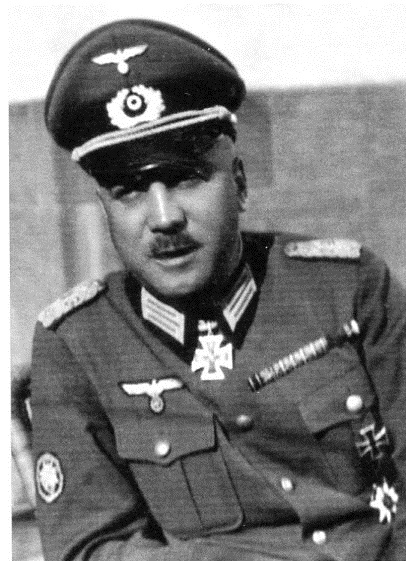More languages
More actions
mNo edit summary Tag: Visual edit |
No edit summary Tag: Visual edit |
||
| Line 1: | Line 1: | ||
{{Infobox person|name=August Sorko|image=August Sorko 2.jpg|birth_date=9 August 1891|birth_place=[[Klagenfurt]], [[The Kingdoms and Lands Represented in the Imperial Council (1867–1918)|Cisleithania]], [[Austro-Hungarian Monarchy (1867–1918)|Austria-Hungary]]|death_date=19 July 1941 (aged 49)|death_place=[[Makhnivka (village)|Komsomolske]], [[Ukrainian Soviet Socialist Republic (1919–1991)|Ukrainian SSR]], [[Union of Soviet Socialist Republics (1922–1991)|Soviet Union]]|death_cause=Execution by beheading}} | {{Infobox person|name=August Sorko|image=August Sorko 2.jpg|birth_date=9 August 1891|birth_place=[[Klagenfurt]], [[The Kingdoms and Lands Represented in the Imperial Council (1867–1918)|Cisleithania]], [[Austro-Hungarian Monarchy (1867–1918)|Austria-Hungary]]|death_date=19 July 1941 (aged 49)|death_place=[[Makhnivka (village)|Komsomolske]], [[Ukrainian Soviet Socialist Republic (1919–1991)|Ukrainian SSR]], [[Union of Soviet Socialist Republics (1922–1991)|Soviet Union]]|death_cause=Execution by beheading}} | ||
'''August Sorko''' (9 August 1891 – 19 July 1941) was an [[Austro-Hungarian Monarchy (1867–1918)|Austrian]] colonel who served in the [[German Reich (1933–1945)|Nazi German]] [[Wehrmacht]] during the [[Second World War]]. He purportedly | '''August Sorko''' (9 August 1891 – 19 July 1941) was an [[Austro-Hungarian Monarchy (1867–1918)|Austrian]] colonel who served in the [[German Reich (1933–1945)|Nazi German]] [[Wehrmacht]] during the [[Second World War]]. He purportedly, according to the Germans, died at the hands of the [[Union of Soviet Socialist Republics (1922–1991)|Soviets]] within a month of [[Operation Barbarossa|the initial German invasion of the USSR]] (although it should be noted that [[National Socialism|Nazi]] and [[Neo-Nazism|Neo-Nazi]] sources are generally considered unreliable). Afterwards Sorko's death was used by [[National Socialist German Workers' Party|Nazi]] newspapers such as the ''[[Völkischer Beobachter]]'' for propaganda purposes, namely, demonstrating how "beastly" and "inhumane" the Soviets supposedly were for defending themselves.<ref>{{Web citation|author=No author|newspaper=[[Völkischer Beobachter]]|title=Einen Bewußtlosen enthauptet|date=1941-08-01|url=https://anno.onb.ac.at/cgi-content/anno?aid=vob&datum=19410801&seite=5&zoom=33|archive-url=https://web.archive.org/web/20230201054250/https://anno.onb.ac.at/cgi-content/anno?aid=vob&datum=19410801&seite=5&zoom=33|archive-date=2023-02-01|retrieved=2023-02-01}}</ref> | ||
==References== | ==References== | ||
<references /> | <references /> | ||
[[Category:Recipients of the Knight's Cross of the Iron Cross]] | [[Category:Recipients of the Knight's Cross of the Iron Cross]] | ||
Revision as of 23:13, 1 February 2023
August Sorko | |
|---|---|
 | |
| Born | 9 August 1891 Klagenfurt, Cisleithania, Austria-Hungary |
| Died | 19 July 1941 (aged 49) Komsomolske, Ukrainian SSR, Soviet Union |
| Cause of death | Execution by beheading |
August Sorko (9 August 1891 – 19 July 1941) was an Austrian colonel who served in the Nazi German Wehrmacht during the Second World War. He purportedly, according to the Germans, died at the hands of the Soviets within a month of the initial German invasion of the USSR (although it should be noted that Nazi and Neo-Nazi sources are generally considered unreliable). Afterwards Sorko's death was used by Nazi newspapers such as the Völkischer Beobachter for propaganda purposes, namely, demonstrating how "beastly" and "inhumane" the Soviets supposedly were for defending themselves.[1]
References
- ↑ No author (1941-08-01). "Einen Bewußtlosen enthauptet" Völkischer Beobachter. Archived from the original on 2023-02-01. Retrieved 2023-02-01.
